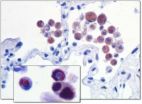(Press-News.org) This news release is available in French.
When you throw a wild pitch or sing a flat note, it could be that your basal ganglia made you do it. This area in the middle of the brain is involved in motor control and learning. And one reason for that errant toss or off-key note may be that your brain prompted you to vary your behavior to help you learn, from trial-and-error, to perform better.
But how does the brain do this, how does it cause you to vary your behavior?
Along with researchers from the University of California, San Francisco, Indian Institute of Science Education and Research and Duke University, Professor Woolley investigated this question in songbirds, which learn their songs during development in a manner similar to how humans learn to speak. In particular, songbirds memorize the song of their father or tutor, then practice that song until they can produce a similar song.
"As adults, they continue to produce this learned song, but what's interesting is that they keep it just a little bit variable" says Woolley. "The variability isn't a default, it isn't that they can't produce a better version, they can -- in particular when they sing to a female. So when they sing alone and their song is variable it's because they are actively making it that way."
The team used this change in the variability of the song to look at how the activity of single cells in different parts of the brain altered their activity depending on the social environment.
"We found that the social modulation of variability emerged within the basal ganglia, a brain area known to be important for learning and producing movements not only in birds but also in mammals, including humans" says Woolley. "This indicates that one way that the basal ganglia may be important in motor learning across species is through its involvement in generating variability."
The researchers studied song birds because they have a cortical-basal ganglia circuit that is specific for singing. In contrast, for most behaviors in other species, the cortical-basal ganglia cells and circuits that are important for particular behaviors, like learning to walk, may be situated right next to, or even intermingled with cells and circuits important for other behaviors. "The evolution in songbirds of an identifiable circuit for a single complex behavior gives us a tremendous advantage as we try to parse out exactly what these parts of the brain do and how they do it," says Woolley.
Useful for Parkinson's disease
The basal ganglia is dramatically affected in illnesses such as Parkinson's and Huntington disease. The team's findings may eventually be relevant to understanding changes to learning and flexibility in movement that occur in those diseases.
"These are the kind of questions that we are now starting to pursue in the lab: how variability is affected when you radically manipulate the system akin to what happens during disease", says Woolley.
INFORMATION:
Prof. Woolley's lab: http://sarahwoolleylab.wordpress.com/
To read the article "Emergence of context-dependent variability across a basal ganglia network" in Neuron: http://www.sciencedirect.com/science/article/pii/S0896627314000701
What songbirds tell us about how we learn
McGill researcher pinpoints an important role of the basal ganglia in vocal learning across species
2014-04-08
ELSE PRESS RELEASES FROM THIS DATE:
NASA satellite sees Tropical Depression Peipah approaching Philippines
2014-04-08
As Tropical Depression Peipah continues moving toward the central Philippines, NASA's Aqua satellite passed overhead and took an infrared look at the cloud top temperatures for clues about its strength.
On April 8 at 05:11 UTC/1:11 a.m. EDT/11 p.m. Manila local time, the Atmospheric Infrared Sounder instrument known as AIRS gathered infrared data on Tropical Depression Peipah. AIRS is one of the instruments that flies aboard NASA's Aqua satellite. The AIRS data showed thunderstorms with very cold cloud-top temperatures surrounded the center of the low-level circulation ...
Intranasal ketamine confers rapid antidepressant effect in depression
2014-04-08
A research team from the Icahn School of Medicine at Mount Sinai published the first controlled evidence showing that an intranasal ketamine spray conferred an unusually rapid antidepressant effect –within 24 hours—and was well tolerated in patients with treatment-resistant major depressive disorder. This is the first study to show benefits with an intranasal formulation of ketamine. Results from the study were published online in the peer-reviewed journal Biological Psychiatry on April 2, 2014.
Of 18 patients completing two treatment days with ketamine or saline, eight ...
DNA modifications measured in blood signal related changes in the brain
2014-04-08
Johns Hopkins researchers say they have confirmed suspicions that DNA modifications found in the blood of mice exposed to high levels of stress hormone — and showing signs of anxiety — are directly related to changes found in their brain tissues.
The proof-of-concept study, reported online ahead of print in the June issue of Psychoneuroendocrinology, offers what the research team calls the first evidence that epigenetic changes that alter the way genes function without changing their underlying DNA sequence — and are detectable in blood — mirror alterations in brain tissue ...
New methodology to find out about yeast changes during wine fermentation
2014-04-08
This knowledge is of particular interest for producers, since changes in the grape directly affect the chemical composition of the must.
The thesis entitled "Estudios avanzados de la fisiología de levadura en condiciones de vinificación. Bases para el desarrollo de un modelo predictivo" [Advanced studies into yeast physiology in vinification conditions. Bases for developing a forecasting model] is part of the Demeter project. This project seeks to study and find out the effects of climate change on viticultural and oenological activities, and to come up with new strategies ...
From learning in infancy to planning ahead in adulthood: Sleep's vital role for memory
2014-04-08
Boston - April 8, 2014 - Babies and young children make giant developmental leaps all of the time. Sometimes, it seems, even overnight they figure out how to recognize certain shapes or what the word "no" means no matter who says it. It turns out that making those leaps could be a nap away: New research finds that infants who nap are better able to apply lessons learned to new skills, while preschoolers are better able to retain learned knowledge after napping.
"Sleep plays a crucial role in learning from early in development," says Rebecca Gómez of the University of ...
Innovative, coordinated brain care could save billions of health care dollars
2014-04-08
INDIANAPOLIS -- Studies have shown that a new patient and caregiver centered model of innovative, coordinated brain care for older adults improves health outcomes and quality of care for those with cognitive impairment. A new study from the Regenstrief Institute, Eskenazi Health and Indiana University Center for Aging Research implementation scientists who developed the Healthy Aging Brain Center care model shows that such care also produces impressive cost savings.
The Healthy Aging Brain Center care model generated an annual net cost savings of up to $2,856 per patient ...
New epidemiology model combines multiple genomic data
2014-04-08
PROVIDENCE, R.I. [Brown University] — The difference between merely throwing around buzzwords like "personalized medicine" and "big data" and delivering on their medical promise is in the details of developing methods for analyzing and interpreting genomic data. In a pair of new papers, Brown University epidemiologist Yen-Tsung Huang and colleagues show how integrating different kinds of genomic data could improve studies of the association between genes and disease.
The kinds of data Huang integrates are single-nucleotide differences in DNA, called SNPs, data on gene ...
Western University study unlocking secrets of breast tissue
2014-04-08
A unique population of microbes in the female breast may lay the groundwork for understanding how this bacterial community contributes to health and disease, according to a new study out of Western University (London, Canada). The study titled "Microbiota of human breast tissue," is now published online, in advance of the May issue of Applied and Environmental Microbiology.
The human body is home to a large and diverse population of bacteria with properties that are both harmful and beneficial to our health. Studies are revealing the presence of bacteria in unexpected ...
Expanding particles to engineer defects
2014-04-08
Materials scientists have long known that introducing defects into three-dimensional materials can improve their mechanical and electronic properties. Now a new Northwestern study finds how defects affect two-dimensional crystalline structures, and the results hold information for designing new materials.
In packed, two-dimensional crystalline systems, such as in photonic two-dimensional crystals, the particles are organized in hexagonal lattices. One particle is in the center of the hexagon with six neighboring particles around it. A defective lattice is when the center ...
More insights from tissue samples
2014-04-08
This news release is available in German.
They discovered that the so-called HOPE method allows tissue samples to be treated such that they do not only meet the requirements of clinical histology, but can still be characterised later on by modern methods of proteomics, a technique analysing all proteins at once. This is successful, since the structure of the tissue is "fixed" in a way that the protein molecules remain accessible for systematic analysis. This technique therefore meets current requirements in terms of a more personalised medicine and thus opens up ...
LAST 30 PRESS RELEASES:
Novel camel antimicrobial peptides show promise against drug-resistant bacteria
Scientists discover why we know when to stop scratching an itch
A hidden reason inner ear cells die – and what it means for preventing hearing loss
Researchers discover how tuberculosis bacteria use a “stealth” mechanism to evade the immune system
New microscopy technique lets scientists see cells in unprecedented detail and color
Sometimes less is more: Scientists rethink how to pack medicine into tiny delivery capsules
Scientists build low-cost microscope to study living cells in zero gravity
The Biophysical Journal names Denis V. Titov the 2025 Paper of the Year-Early Career Investigator awardee
Scientists show how your body senses cold—and why menthol feels cool
Scientists deliver new molecule for getting DNA into cells
Study reveals insights about brain regions linked to OCD, informing potential treatments
Does ocean saltiness influence El Niño?
2026 Young Investigators: ONR celebrates new talent tackling warfighter challenges
Genetics help explain who gets the ‘telltale tingle’ from music, art and literature
Many Americans misunderstand medical aid in dying laws
Researchers publish landmark infectious disease study in ‘Science’
New NSF award supports innovative role-playing game approach to strengthening research security in academia
Kumar named to ACMA Emerging Leaders Program for 2026
AI language models could transform aquatic environmental risk assessment
New isotope tools reveal hidden pathways reshaping the global nitrogen cycle
Study reveals how antibiotic structure controls removal from water using biochar
Why chronic pain lasts longer in women: Immune cells offer clues
Toxic exposure creates epigenetic disease risk over 20 generations
More time spent on social media linked to steroid use intentions among boys and men
New study suggests a “kick it while it’s down” approach to cancer treatment could improve cure rates
Milken Institute, Ann Theodore Foundation launch new grant to support clinical trial for potential sarcoidosis treatment
New strategies boost effectiveness of CAR-NK therapy against cancer
Study: Adolescent cannabis use linked to doubling risk of psychotic and bipolar disorders
Invisible harms: drug-related deaths spike after hurricanes and tropical storms
Adolescent cannabis use and risk of psychotic, bipolar, depressive, and anxiety disorders
[Press-News.org] What songbirds tell us about how we learnMcGill researcher pinpoints an important role of the basal ganglia in vocal learning across species




